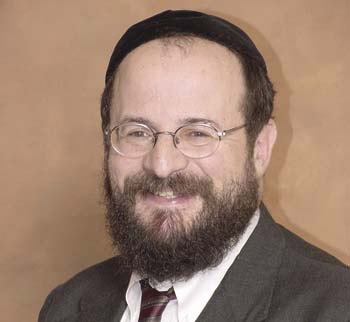TORONTO — Julius Ciss and Rabbi Michael Skobac are well-known among “messianic Jews,” and when Ciss showed up at a recent program in a seniors residence, organizers asked him to leave.
For years, Ciss and Rabbi Skobac have been monitoring the activities of organizations targeting Jews, showing up at their meetings and conferences with a counter-message: that the “messianic” community is not offering Jews a different way to fulfil their Judaism, but are enticing people to adopt the Christian faith.
What particularly concerns them is the “deceptive” manner in which recruitment is conducted: the flyer advertising the Chanukah program made no mention of the fact that the sponsor was a Christian organization. In fact, they say, in keeping with Christian outreach efforts to Jews, it misleadingly makes it appear the event is Jewish, when it’s not.
“We want to show people that it’s not a Jewish event,” Ciss said in an interview in Jews for Judaism’s cramped quarters. “It’s a missionary event.”
Though the event included Jewish traditions, like lighting candles and singing songs, the missionaries provide followup literature hoping to entice participants into, eventually, “believing in Jesus,” Ciss said.
Displaying plenty of chutzpah, Ciss stood at a window outside the meeting room, holding a sign informing participants that what the event they were attending was not really kosher.
Though Jews for Judaism Canada employed a low-tech media message on that occasion, it has increasingly turned to more up-to-date digital formats to counter missionary activities.
Evangelists have already adopted Facebook and Twitter to recruit. “They see it as incredibly fertile grounds for them,” Rabbi Skobac said. Their spin is to position Jesus as the full and final expression of Judaism and not as an alternative religion.
Jews for Judaism has placed a video on YouTube addressing that argument. It has paid for an ad on Google that takes viewers to YouTube with video of lectures and TV appearances by Rabbi Skobac. “We’re getting incredible results,” he said, with 120,000 views in April alone and more than 50,000 on KosherTube.
Rabbi Skobac, who had to “get schlepped onto Facebook,” now has 4,300 friends. “We do a lot of Jews for Judaism work through Facebook. We get 10 inquiries a day through our Facebook portal,” he said.
Using 21st-century media techniques helps Jews for Judaism keep the fight on a level playing field, but Ciss and Rabbi Skobac believe missionary groups are deceptive in their fundamental message. They wouldn’t otherwise leave out the sponsoring group when they publicize ostensibly Jewish events.
The recent event at a Toronto seniors residence was one such example, they said. A Hamilton messianic congregation likewise publicized an ostensibly Jewish event in a flyer without including any mention of the sponsoring organization, Ciss stated.
“It’s not making it clear that it’s a Christian organization trying to convert you to Christianity,” Rabbi Skobac said.
Chosen People Ministries recently held a training session, and “many of this year’s participants are Filipinos, many of them caregivers in Jewish homes and senior residences,” Rabbi Skobac said.
“We’ve always known that missionaries target seniors and people in nursing homes,” he continued. “Caregivers who are proselytizing is going on worldwide. These are people who are often religious” and want to share their beliefs. “They don’t want that poor old Jewish person to go to hell if they don’t embrace Jesus,” he said.
“Missionaries see caregivers as potential recruiters to target people who are vulnerable,” he added. “We’re not trying to create a panic, to imply that all Filipino caregivers are a problem, just to make people aware this is going on. Knowledge is power.”
There are some 180 missionary groups operating in North America, including some that consist of Jews who’ve converted.
“It is not diminishing,” Ciss said.
“It is not as if these people are trying but not succeeding,” Rabbi Skobac continued. “It’s a lot of work to convert the small numbers of people converting.”
Sometimes the effort begins innocuously enough, with missionaries spending time in coffee shops in Jewish neighbourhoods, reading their Bibles and trying to start conversations about Scripture. Another tactic is to send a couple of dozen missionaries to the annual Walk for Israel. They’d wear a T-shirt that stated, “Ask me about my rabbi,” or “I love [using a heart] Yeshua,” the Hebrew name for Jesus.
When it comes right down to it, the primary message of missionaries is not one of biblical interpretation. “You might get the impression it’s all about Bible verses. Our experience has been that generally Jews don’t convert to Christianity because of what the Bible says. It’s for other reasons. Usually, it’s feeling a spiritual vacuum,” Rabbi Skobac said.
It’s the same reason some Jews explore Buddhism. The problem is “they don’t know much about Judaism; they had a shallow religious experience. They have a hole in the soul,” he said.
They feel Christianity provides a spiritual outlet and “once they embrace Christianity, they get interested in the Bible.”
“Jews for Judaism exposes them to Jews who take God seriously, who pray to God every day and not necessarily from a prayer book.
“We get them to know who we are as people of faith and let them see there is something outside of the church.
“They’re afraid. They’re on a lifeboat and [they fear] if they step off, there’s nothing there. We show Judaism’s spiritual side.”
“We spread the word that Judaism has this stuff… that Jewish teachings affect the core of our lives.”
